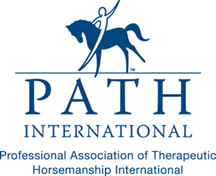|
Welcome to another edition of the STEPS Herd Member Spotlight! Today, we're delighted to feature an interview with Maggie, the matriarch of the STEPS herd. Conducting the interview is none other than our very own Bob, a charming and curious member of the herd who always brings a unique perspective to our conversations. Let's dive right in and hear Maggie's incredible story in her own words. Bob: Hi Maggie! Thanks for taking the time to chat with me today. Let's start at the beginning. Can you tell us a bit about your life before coming to STEPS? Maggie: Hi Bob! It's a pleasure to chat with you. My story began in a place I’d rather forget—a kill lot. It was December 2014 when a rescue group found me and my filly, Molly. We were both in a pretty rough spot, and I was terrified of what the future held. Bob: That sounds really scary. How did you end up getting rescued? Maggie: The rescue group managed to track down my previous owner through my papers. Molly was my first foal, and I was very protective of her. They noticed an indentation on my side where a girth would go, a sign that I had experienced some rough handling in the past. The Thomas Foundation was contacted to take Molly. When they arrived, they insisted on taking in just Molly, but also me and another orphaned filly named Candy. Bob: Wow, that must have been quite a day. I heard you gave them a bit of a chase? Maggie: [laughs] Yes, I did! Molly and Candy loaded easily, but I wasn’t so sure. I broke loose and led everyone on a merry chase around the pasture. I guess I was just too scared to face what might come next. Eventually, I realized they meant no harm and agreed to load. Bob: It's completely understandable to be cautious. So, where did you go after that? Maggie: I moved around a bit and got to know some wonderful humans who took great care of me. Eventually, Molly and Candy were adopted together by a wonderful family in Sedona in December 2020. They’re now working cow horses on thousands of acres, living their best lives. Bob: It must have been hard to be separated from Molly and Candy. Did you make any new friends at the ranch? Maggie: Absolutely, it was tough to see them go, but I’m so happy they found a good home. At the ranch, I became great friends with Sissy. We’ve been inseparable ever since. I only agreed to come to STEPS if Sissy could come with me. Bob: It's great to hear you found a close friend in Sissy. How would you describe your life now at STEPS? Maggie: Life at STEPS is peaceful and fulfilling. I get to be with my herd, enjoy the company of wonderful people, and most importantly, feel safe and loved. I’ve always been a protector, and here, I can finally let my guard down and let others take care of me too. Bob: Speaking of letting your guard down, I wanted to ask you about your work with clients who have experienced trauma and PTSD. With PTSD Awareness Month upon us, could you tell us how you help these clients through equine assisted counseling? Maggie: Absolutely, Bob. Equine assisted counseling can be incredibly beneficial for clients with PTSD. The grounding effect of interacting with us horses helps clients feel safe enough to start processing their past trauma. Horses, like us, live in the present moment. When clients spend time with us, they often find it easier to stay grounded and focus on the here and now. Bob: That makes a lot of sense. How do you think being among the herd helps clients let their guard down? Maggie: When clients are among us, they often feel accepted and understood without judgment. Our calm and gentle nature provides a sense of security, allowing them to relax and let their defenses down. It’s much like how I feel safe and loved here at STEPS. This environment helps clients begin to trust again, both in themselves and in others. Bob: That sounds really powerful. Can you talk about how clients learn to readjust to life after trauma by observing the herd? Maggie: Certainly. Horses are naturally aware of our surroundings but not overly hypervigilant. We respond to potential threats appropriately, but once we assess that we’re safe, we return to a calm state. Clients can learn a lot from observing this behavior. It shows them how to balance awareness with relaxation, helping them understand that it’s possible to feel safe without being constantly on high alert. Bob: That’s such an important lesson. What about the acceptance and empathy people feel from the herd? How does that contribute to their healing? Maggie: The acceptance and empathy they feel from us are crucial for their healing. Many clients with PTSD have experienced rejection or misunderstanding from others. Here, they find unconditional acceptance. We don’t judge their past or their pain. Instead, we offer a nonverbal connection that can be incredibly soothing and validating. This empathy helps clients feel seen and valued, which is a significant step toward healing. Bob: I know the work you do is truly transformative. How do you feel being a part of this process? Maggie: It’s incredibly fulfilling, Bob. Knowing that I can help someone find peace and start healing from their trauma is a wonderful feeling. Just as I found a safe haven here, I’m glad to be part of providing that for others. It’s a beautiful cycle of healing and connection. Bob: Thanks for sharing, Maggie. It’s clear that your work is making a big difference in the lives of many. Here’s to continuing to support and heal together, especially during PTSD Awareness Month. Maggie: Thank you, Bob. It’s been a pleasure talking with you. Here’s to our wonderful herd and the bright future ahead! Stay tuned for more heartwarming stories and interviews from our beloved herd members. Until next time, take care and cherish the bonds that make us family. During PTSD Awareness Month, you can make a difference by Donating or joining Maggie's Carrot Club! Want to work with Maggie as a client? Fill out a Counseling Interest Form!
0 Comments
Finding Strength and Healing from Trauma: Rosa's Journey with Belle in Equine Assisted Counseling5/29/2024 Rosa* walked slowly toward her new therapist, her heart heavy with the memories that had haunted her for years. The path to this place had been long and arduous, marked by a series of painful experiences from childhood that had cast long shadows into her adulthood. Today, she was meeting the STEPS Herd. Upon entering the pasture, Rosa was immediately drawn to Belle. As Rosa approached, Belle lifted her head from the hay, her large brown eyes locking onto Rosa's. There was something profoundly soothing in Belle's gaze, a calmness that seemed to radiate from the very core of the horse. Rosa felt a slight easing of the tightness in her chest, a breath she didn't realize she'd been holding slowly escaping. The equine assisted counseling sessions were a new approach for Rosa, recommended by her former therapist after traditional methods had only scratched the surface of her deep-seated trauma. Belle, a beautiful black and white paint mare, was known for her remarkable ability to connect with people in profound ways, offering a sense of peace and validation through her presence. Belle approached Rosa without hesitation, her movements slow and deliberate. Rosa felt a mix of awe and anxiety as the horse came closer, eventually nuzzling her hand. The simple touch was grounding, pulling Rosa from the swirling vortex of her thoughts into the present moment. Her therapist observed quietly, letting the interaction unfold naturally. In the weeks that followed, Rosa's sessions with Belle became a sanctuary. As she stroked Belle's coat, Rosa would talk, sometimes in halting sentences, other times in a torrent of words, about her past. Belle's calming presence made it easier to face the painful memories, her warmth acting as a balm for Rosa's pain. One particularly difficult session, Rosa found herself overwhelmed by a flood of memories from her childhood. She stopped stroking Belle and sank to the ground, tears streaming down her face. Belle, sensing Rosa's distress, lowered her head and nuzzled Rosa gently. The horse's soft breath against her skin was a reminder of the present, a contrast to the harshness of the past she was reliving. "Feel Belle's presence," the therapist’s voice came softly. "She's here with you, right now." Rosa reached up, running her fingers through Belle's mane. The simple act of connecting with the horse brought her back to the here and now, away from the dark corners of her mind. Belle's steady, rhythmic breathing was like an anchor, grounding Rosa in a moment of safety. As Rosa continued her sessions, she noticed changes within herself. Belle's feedback, though silent, was profound. When Rosa was anxious or angry, Belle would become still, a contrast to Rosa’s inner turmoil. These interactions helped Rosa recognize her own emotions more clearly. She began to understand the impact of her feelings, not just on herself, but on those around her. Belle's reactions were honest and immediate, devoid of judgment, and this unfiltered feedback was invaluable. It allowed Rosa to see her emotions not as something to be feared or suppressed, but as natural responses to her experiences. One day, during a session, Rosa felt a surge of anger as she recounted an incident from her past. Rosa then quickly tried to push the anger back down. Belle took a few steps back, her ears flicking with unease. Rosa paused, realizing the impact of her avoidance of her emotions. She took a deep breath, consciously acknowledging the emotion. Belle's ears relaxed, and she stepped forward again, closing the gap between them. "You're learning to manage your emotions," the therapist observed. "Belle is showing you how it’s okay to feel what you’re feeling." Rosa nodded, a small smile forming on her lips. For the first time in a long while, she felt a sense of control over her own emotions, a sense of empowerment. The validation Rosa found through Belle's treatment was transformative. Belle accepted her without hesitation, offering companionship without demands. This unconditional acceptance helped Rosa see her own worth and strengths. She began to believe in her ability to heal, to find peace amidst the chaos of her past. Months later, Rosa stood beside Belle, her hand resting on the horse's neck. The journey was far from over, but Rosa felt a resilience she hadn't known before. Belle had not just been a companion; she had been a guide, leading Rosa through the labyrinth of her traumas to a place of acceptance and strength. As Rosa pressed her forehead gently against Belle's, she whispered, "Thank you." The mare nickered softly, as if acknowledging the words. In that moment, surrounded by the quiet of the stable and the steady presence of Belle, Rosa felt a profound sense of gratitude and hope for the future. *Name and details changed to protect client privacy and identity. Photo does not depict real client. Belle is proudly sponsored by Navy Federal Credit Union. To join Belle's Carrot Club and support her powerful work, visit Belle's page. Want to work with Belle as a client? Fill out the Counseling Interest Form! 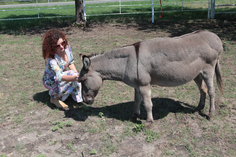 Recovering from traumatic experiences is a deeply personal journey, and not every approach works for everyone. Anyone who has experienced a deeply stressful, upsetting, or traumatic event can develop PTSD. If you're searching for an alternative to traditional office-based therapy, let us introduce you to the incredible world of Equine Assisted Counseling. At STEPS With Horses, we believe in the power of combining horses and human connection to facilitate healing. Join us as we explore how our Relational Equine-Partnered Counseling approach can address each cluster of PTSD and provide a path towards renewed strength and hope. Intrusive Thoughts, Feelings, and Memories Dealing with the intense emotions and physical sensations associated with past traumas can be overwhelming. Nightmares, flashbacks, and unwanted memories make everyday life a challenge. This is where our equine partners come in. With their innate ability to sense human emotions, they become powerful allies in helping us recognize triggers, manage negative feelings, and develop coping skills. Together, we'll navigate through the difficult moments and find ways to restore peace and emotional balance. Avoidance and Numbing We all have a natural tendency to avoid painful thoughts and emotions linked to our trauma. But what if you had a judgment-free space to express yourself openly? That's exactly what our equine partners provide. Through building a relationship with them, you'll create a safe environment that encourages vulnerability and reduces avoidance of people, places, and things associated with your past trauma. Equines will guide you in practicing calming techniques and gradually help you face the triggers that once seemed insurmountable. They understand the importance of fostering trust and healing, supporting you in reconnecting with the world around you. Patterns of Negative Thoughts and Mood Trauma can make us feel disconnected from ourselves and others, trapping us in a cycle of negativity. However, the presence of these majestic creatures has a magical effect. Just being around them sparks a sense of joy and connection that can be transformative. Equines have a unique way of awakening the "connecting part" of our brains, allowing us to rediscover the beauty of human relationships. Engaging in physical activities with them reignites our passions and revitalizes our motivation for life's everyday joys. Physical and Emotional Reactivity Living with constant hypervigilance and an underlying sense of unease takes its toll. Equines, as prey animals, are naturally alert and aware of their surroundings. They provide a powerful example of being vigilant while also finding moments of relaxation and enjoyment. Spending time with these gentle giants will teach you to let your guard down, view your surroundings with clarity, and experience a sense of peace. As you engage with them, you'll witness firsthand their ability to reduce reactivity and find harmony within their environment. Take the First Step Towards Healing! If you're ready to embark on a journey of healing and transformation, STEPS With Horses is here to support you every step of the way. Our Equine Assisted Counseling program offers a compassionate and innovative approach to address PTSD. Reach out today and take that first courageous step towards reclaiming your life. And to those who wish to make a lasting impact, your generous support as a donor enables us to continue providing life-changing services to those in need. Give a gift today! Contact us by phone at 682-219-8733 or send us a message to learn more about our services and start your journey today. *Photos depict models, not actual STEPS clients
Living with post-traumatic stress disorder (PTSD) can be a daily battle, affecting individuals of all ages. Coping with the aftermath of traumatic experiences requires a unique and holistic approach to healing. Equine assisted counseling, an innovative counseling approach, offers a powerful avenue for individuals with PTSD to embark on a transformative journey of self-discovery and recovery. In this blog post, we will explore how the presence of equines, the tranquil herd environment, and the psychotherapeutic process itself can help clients find solace, build resilience, and reclaim their lives. Staying Grounded in the Presence of Equines Equines have an innate ability to sense and respond to human emotions, providing a remarkable sense of grounding and presence. When engaging in equine assisted counseling, clients often find solace in the comforting presence of these majestic animals. The physicality and immediacy of interacting with equines help individuals stay grounded in the present moment, allowing them to step away from the overwhelming memories and anxieties that frequently accompany PTSD. Creating a Safe Space within the Tranquil Herd Environment The serene and tranquil environment where equine assisted counseling takes place can be profoundly therapeutic for clients with PTSD. Equines live in a tightly bonded herd, characterized by a sense of safety, trust, and acceptance. As clients enter this environment, they experience a unique sense of belonging, free from judgment or expectations. The herd’s peacefulness and non-verbal communication become a catalyst for emotional healing and growth. Processing Difficult Experiences and Emotions The powerful presence of equines in equine assisted counseling sessions can help clients navigate and process difficult experiences and emotions associated with PTSD. As clients form connections with the equines, they often find it easier to express and explore their own traumatic memories. Equines become gentle guides in the healing process, allowing individuals to confront and work through their emotions at a pace that feels manageable. 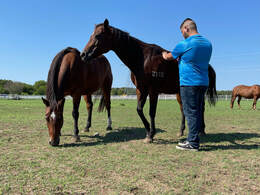 Recognizing the Window of Tolerance Equine assisted counseling empowers clients to recognize their own “window of tolerance” – the range of emotional states in which they can function effectively. By observing how equines respond to their emotions, individuals with PTSD can gain insight into their own physiological and emotional reactions. Through this self-awareness, they learn to identify when they are becoming overwhelmed and develop skills to regulate their emotional states more effectively. Learning to Identify Needs, Communicate, and Set Healthy Boundaries Interacting with equines can be a powerful experience for clients, helping them gain insight into patterns of communication, assertiveness, and boundary setting. Equines respond to non-verbal cues and provide immediate feedback, creating a safe space for clients to practice assertiveness and healthy communication. Equine assisted counseling facilitates the development of crucial life skills, empowering individuals to identify their own needs, communicate effectively, and establish healthy boundaries – invaluable tools for navigating relationships and building resilience in their everyday lives. Increasing Positive Feelings and Hopefulness The transformative power of equine assisted counseling extends beyond immediate therapeutic sessions. Clients often report increased positive feelings and a restored sense of hopefulness about the future. The relationships formed with the equines, the supportive therapeutic environment, and the progress made in addressing their PTSD symptoms contribute to a renewed belief in their own resilience and capacity for growth. Improved Self-Worth and Self-Compassion Equine assisted counseling can profoundly impact clients’ perceptions of self. Through their interactions with equines, individuals develop a deep sense of self-acceptance, self-worth, and self-compassion. Equines, with their ability to meet individuals exactly where they are, empower clients to embrace their vulnerabilities, strengths, and unique qualities. As clients witness the non-judgmental response from these intuitive creatures, they begin to see themselves through a lens of kindness and appreciation 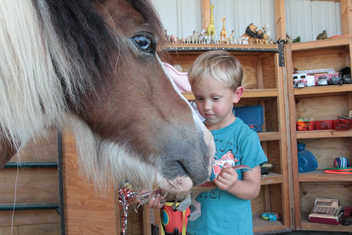 STEPS With Horses, a 501c3 nonprofit dedicated to equine assisted mental health services, offers two distinct approaches to address PTSD in different age groups. Our Relational Equine-Partnered Counseling approach focuses on building safe and trusting relationships with equines, integrating principles of interpersonal neurobiology, and creating a space for clients to explore their personal beliefs and experiences. This approach is designed for older children, teens, and adults, emphasizing experiential therapy and the therapeutic power of the equine-human connection. For younger children ages 4 and older, STEPS offers Equine-Partnered Play Therapy. This form of play therapy enables children to engage with miniature horses while expressing and processing their thoughts, feelings, and experiences through play – their language, and toys – their words. The presence of these horses aids children in gaining greater self-regulation, self-control, empathy, self-awareness, decision-making, communication, and confidence. By harnessing the healing power of equines, STEPS With Horses provides invaluable support to those living with PTSD, helping them rediscover their strength, resilience, and hope for a brighter future. If you are interested in experiencing the power of the human-equine relationship, contact us at www.stepswithhorses.org/contact Interested in giving the life-changing gift of equine assisted counseling? Support our clients and our therapy herd at www.stepswithhorses.org/donate Categories All ArchivesTroy* was a Navy veteran who had lost several friends to suicide. He had also attempted suicide himself and struggled with PTSD from this experience. Despite his best efforts, Troy found himself overwhelmed by grief and anxiety. He was struggling to find a way to process his emotions and move forward. One day, his cousin suggested he try equine assisted counseling. When Troy arrived for his first session, he was highly anxious. He had never worked with horses before and wasn’t sure what to expect. He was immediately drawn to a horse named Sassy who was the first to approach him. Despite her bold approach, there was something calming about Sassy that drew Troy toward her. As Troy spent more time with Sassy, he began to notice how her behavior changed when his emotions changed. Recognizing changes in Sassy’s behavior helped Troy begin to gain a greater awareness of his own emotions and new perspective on how he was feeling. With Sassy by his side, Troy felt more comfortable to talk about his experiences, even the traumatic ones, with more ease. He found that having a hand on Sassy’s neck helped him stay calmer during these conversations. Through his time with Sassy, Troy also began to explore his own sense of self since leaving the military. He realized that he struggled with decision-making and was often unsure of what he wanted. But, as Troy continued to work with Sassy and the other horses, he became more confident in recognizing how they communicated with him. In turn, Troy became more confident in recognizing his own needs and communicating them to the horses. As Troy approached the end of his time in equine assisted counseling, he recognized many ways that the horses had helped him change. He noticed that he was more confident, more self-aware, and better able to manage his emotions. Troy expressed gratitude for the experience and how he would continue to use the skills learned from his time with Sassy for the rest of his life. You can help military veterans like Troy during Mental Health Awareness Month! For every donation of $15 or more during the month of May 2023, North Texas Giving Day and The Ramesh and Kalpana Bhatia Family Foundation will add an extra $15, amplifying the impact of your contribution. Donate at https://www.northtexasgivingday.org/organization/stepswithhorses *Names and details have been changed to protect client privacy and identity
|
AuthorSTEPS With Horses Archives
June 2024
Categories
All
|
Let's stay in touch!
Mailing AddressP.O. Box 123737
Fort Worth, TX 76121 |
Telephone |
|
A Texas Nonprofit Corporation and a 501(c)(3) Tax-Exempt Charitable Organization
Copyright 2024 S.T.E.P.S. With Horses





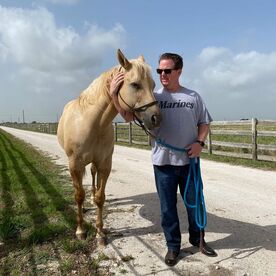
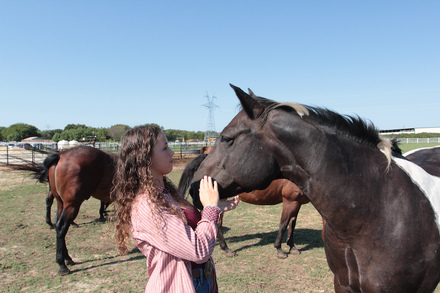
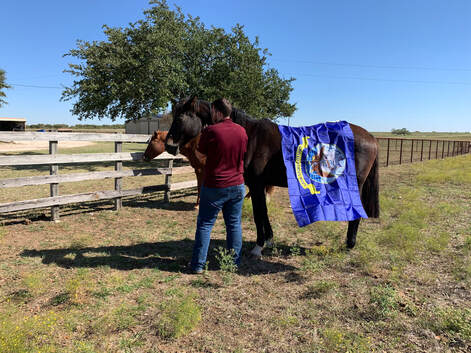
 RSS Feed
RSS Feed
